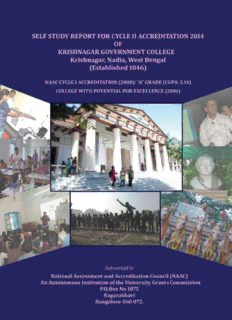
SSR 2015 PDF
Preview SSR 2015
SELF STUDY REPORT FOR CYCLE II ACCREDITATION 2014 OF KRISHNAGAR GOVERNMENT COLLEGE Krishnagar, Nadia, West Bengal (Established 1846) NAAC CYCLE I ACCREDITATION (2008): “A” GRADE (CGPA: 3.14) COLLEGE WITH POTENTIAL FOR EXCELLENCE (2010) Submitted to: National Assessment and Accreditation Council (NAAC) An Autonomous Institution of the University Grants Commission P.O. Box No 1075 Nagarabhavi Bangalore – 560 072 KGC SSR II KGC SSR II KGC SSR II 2014 CONTENTS TABLE OF CONTENTS ITEMS PAGE NO. SECTION A: Preface 1 SECTION B: Executive Summary 3 SECTION C: Profile of the College 15 SECTION D: Criterion Wise Evaluative Report 31 I. Curricular Aspects 33 II. Teaching-Learning and Evaluation 44 III. Research, Consultancy and Extension 80 IV. Infrastructure and Learning Resources 130 V. Student Support and Progression 157 VI. Governance, Leadership and Management 191 VII. Innovations and Best Practices 229 SECTION E: Evaluative Reports of the Departments 239 I. Department of Bengali 241 II. Department of English 249 III. Department of Sanskrit 261 IV. Department of History 270 V. Department of Philosophy 278 VI. Department of Political Science 289 VII. Department of Economics 298 VIII. Department of Geography 307 IX. Department of Physics 328 X. Department of Chemistry 337 XI. Department of Mathematics 350 XII. Department of Botany 360 XIII. Department of Zoology 372 XIV. Department of Physiology 386 XV. Department of Statistics 397 SECTION F: Post Accreditation Initiatives 403 SECTION G: ANNEXURE I 405 SECTION H: Declaration of the Principal 457 SECTION I: Enclosures 459 I. NAAC Accreditation Certificate (Cycle I) 461 II. Certificate of recognition: 2 (f) and 12 (B) of the UGC Act 462 III. Certificate of Affiliation (University of Kalyani) 463 KGC SSR II 2014 PREFACE S A: Preface ECTION Currently the education system of India, both at the national and state level, is experiencing a transitional phase as it is striving to adjust itself to the process of globalisation and economic reforms. Hence two concepts viz. universalization of education and globalization of education have been injected into the domain of policymaking and planning. While universalization is expected to bring about inclusive development by encouraging the under- privileged segments of the society to participate in the formal learning process, globalisation is attempting to integrate the flow of knowledge in the global space. Krishnagar College was established based on the education pattern of the Imperial British Raj. In his epochal Minutes (1835), Thomas Babbington Macaulay puts greater emphasis on higher education than on education for the masses. By and by the necessity of women’s education was also felt, which led to turn this college into a co-educational institution in 1932. Presently, our principal aim is to impart finest quality of higher education to one and all irrespective of differences in gender, caste, creed, religion and socio-economic conditions. This college is located at a distance of 125 Km. from the Metropolis of Kolkata in the District Head Quarter of Nadia District, namely Krishnagar. This is a suburb surrounded by rural atmosphere. Yet, the greater perspective is to help the students to upgrade their socio-economic conditions along with their sense of responsibilities to be good citizens of the nation. The journey of this educational institute started on 28th November, 1845 in a local rented house located at Hatarpara. With the sanction of Lord Hardinge, the then Governor General of India, the college was formally launched on 1st of January and was provided with a grant in 1846 by the British Government. The king (Raja) of Nadia, Srishachandra Roy and the queen (Maharani) of Cossimbazaar of Murshidabad district Srimati Swarnamoyee contributed vast tracts of land for construction of a new college building. Moreover, the local elites also came forward with financial assistance to build up the present palatial building of Krishnagar College. On 1st of June, 1856, the institution was shifted from that rented house to this palace. The first Principal of this college was the eminent Shakespearian scholar Captain D.L. Richardson. From 1865 to 1999 the college was affiliated to the University of Calcutta. From 1999 onwards this college has been incorporated under the University of Kalyani, located 56 Km. to the south of Krishnagar. Post- graduate teaching was introduced in the Departments of Geography and Philosophy in 2002, in the Department of Bengali in 2008 and in the Department of Zoology in 2010. In 2008 the college was given the status of A Grade with CGPA 3.14 by the National Assessment and Accreditation Council of University Grants Commission and in 2010 it acquired the status of College with Potential for Excellence under the auspices of University Grants Commission. The college has undergone many changes and substantial amount of upgradation has taken place in terms of technology, research and teaching which will be discussed in details in the subsequent sections. Attempt has been made to initiate and incorporate the recommendations suggested in the Cycle I of Accreditation. The limitations and challenges faced by the 1
Description: